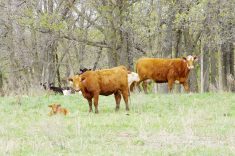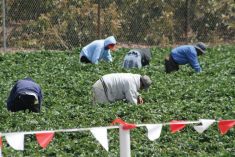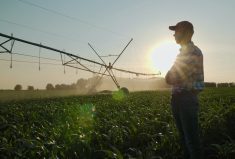No one needs more bad news, but the pandemic is causing upheaval around the world and will produce a ‘very deep’ recession, say two leading economic experts.
“The trade sanctions and the trade issues over the past couple of years were just a precursor of what may occur into the future,” said David Kohl, professor emeritus at Virginia Tech University. “We’re going to see intensified de-globalization discussions. And as we move into this de-globalization phase, the drivers of this change are going to be government and society, business and consumer.
“From a personal, societal, and governmental standpoint, we’re going to see more revenge, blame, confusion, and frustration.”
And despite an unprecedented flood of government aid, the economy is in rocky shape.

“We are entering a recession, and with such a pessimistic forecast, there’s no doubt that this recession is going to be very deep and significant,” said J.P. Gervais, chief economist with Farm Credit Canada.
It’s not all doom and gloom, but farmers need to be aware that their markets are at a greater risk of disruption, both men said in presentations at the virtual Ag in Motion event last month.
Volatility in the global marketplace was ramping up before COVID-19 and it’s already intensifying, said Kohl.
“Australia put a lot of the blame for COVID-19 on China, so what did China do? It basically put sanctions on agricultural products coming out of Australia,” he said.
Read Also

Farming Smarter receives financial boost from Alberta government for potato research
Farming Smarter near Lethbridge got a boost to its research equipment, thanks to the Alberta government’s increase in funding for research associations.
“This could happen to Europe, to Canada, to the United States. Basically we’re going to see a lot of confrontation, particularly with Europe, Canada, and the U.S. versus China.”
Job losses, business failures, and disjointed recovery plans will further exacerbate the situation as consumers are forced to change their spending habits in response. While some businesses and industries have flourished during the pandemic, others have faced “demand destruction.”
“It created economic behavioural change in people going back to the basics,” said Kohl. “We’ve seen a loss of purchasing power, and we don’t know when re-emerging shock waves are going to occur.”
Already, growth in the global economy is going backwards, with a nearly five per cent decline since the start of the pandemic.
“With a decline of 8.4 per cent (in Canada) and a forecasted increase of 4.9 per cent in 2021, we’re not going to get back to the level of economic activity that prevailed at the end of 2019,” said Gervais.
The outlook
On a farm level, farm cash receipts are forecast to drop for all commodities, except for grains and oilseeds, which are expected to see a slight increase of 0.4 per cent. The biggest impact is to the livestock sector, which could see a five per cent decline for beef and a seven per cent decline for hogs.
“The next six months are going to be critical when it comes to overall impact,” said Gervais.
And the outlook is poised to worsen as the United States and other key trading partners grapple with an increase in outbreaks, putting further pressure on the economy, he added.
“The health of the global economy matters a great deal for Canadian ag — we’re a net exporter, so we have a vested interest in seeing the global economy pick up and start to grow again,” said Gervais.
“We’re going to start growing again in this quarter and the next quarter and throughout 2021, but despite the rapid pace of rebound in the economy, at some point this recovery is going to start to slow down.”
That anticipated growth is partly a result of strong demand for Canadian commodities, but even that is shifting.
“What COVID-19 has changed is food-purchasing behaviours,” said Gervais, pointing to the decline in restaurant sales and its impact on at-home consumption. “We’ve seen every sector of the industry being affected in one way or another.
“We’re starting to see a gradual reopening, but it’s going to take time to get back to where we were. But even if we get to that point where restaurants and all food services are fully open, the question is, will consumers get back to the level of spending that they had prior to the crisis?”
In the near term, most consumers are likely to be more frugal and focused on local food supply chains — and that’s where farmers may start to notice the biggest change to their businesses.
“The impact of demand destruction is we’re going to have to align industry segments with consumer shifts,” said Kohl. “We’re also going to see quick supply-and-demand shifts, and we’re going to see see-saw consumption. This is really going to change the business model.”
What farmers need to do
An individual farm’s ability to weather these changes will depend on its financial health — and its owner’s ability to adapt.
“As a result of pressures over the last five years, we’ve approached the COVID-19 crisis from a position of strength, but that strength has been somewhat weakened recently,” said Gervais.
Historically, farmers have had two lines of defence against that. The first is working capital. “That line of defence has been weakening and is generally under the 15-year average. It’s still strong, but weaker than it has been.”
The second is strength in the balance sheet, and on most farms, they also aren’t as robust as they were.
“There have been some equity gains, but the pressure on profitability makes the return on equity really low right now,” he said. “For the last four or five years, it’s been declining.”
But there are some things farmers can do to mitigate some of the effects of this recession on their operations — knowing their cost of production, developing a sound risk management plan, marketing effectively, building working capital, investing in people, and innovating where possible.
Being nimble is also going to be key, said Kohl.
Unlike other ‘black swans’ (the name given to unexpected and deep economic upheavals), the pandemic “hit everybody in the world” all at once.
“Basically, the global economy was put on life support,” he said. “That’s going to create volatility in extremes, which is going to require a manager of agriculture to have a high business IQ to be able to capitalize on that volatility.”
There are four key things that farmers need to focus on, said Kohl, an expert in farm business management who has gained international recognition over his four-decade-long career.
“The ability to plan, strategize, execute, and monitor is going to be critical. But it’s going to require creative leadership, innovation, and adaptation, and we’re going to have to see new business models for success.”
He also issued a warning to those who intend to keep on doing the same things in hopes of riding out the coming storm.
“The 1980s took out a lot of average and below-average production managers,” he said. “This event will take out a bunch of average and below-average business managers who don’t have that business IQ.”















